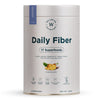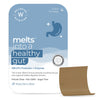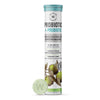When we think about cholesterol and gut health, they may seem like two separate worlds. Cholesterol often gets all the attention in heart health conversations, while the gut is mostly associated with digestion. But here’s the thing—your gut health plays a direct role in regulating cholesterol levels. The trillions of bacteria residing in your gut influence how your body absorbs and processes cholesterol, affecting everything from heart health to metabolism.
So, can your gut be the secret to better cholesterol control? Let’s explore the connection between gut bacteria and cholesterol and how your digestive health can shape your lipid profile.
How Gut Bacteria Influence Cholesterol Levels
Your gut microbiome—home to trillions of microorganisms—does more than just aid digestion. Gut bacteria help regulate digestive health and cholesterol by influencing bile acid metabolism, reducing cholesterol absorption, and even producing compounds that help lower bad cholesterol (LDL).
Some beneficial gut bacteria, such as Lactobacillus and Bifidobacterium, can aid in cholesterol metabolism by breaking down bile acids efficiently [NIH]. On the other hand, an imbalance in gut bacteria can lead to higher production of trimethylamine N-oxide (TMAO), a compound linked to elevated cholesterol levels and heart disease risk.
This disrupted gut microbiome, often due to poor diet, stress, or medication overuse, can lead to increased inflammation, impaired bile acid metabolism, and higher cholesterol levels.
To keep your gut in balance and support healthy cholesterol levels, you need a holistic approach that includes diet, lifestyle changes, and targeted supplementation.
Ways to Maintain a Healthy Gut
A strong gut microbiome is essential for overall health, including balanced cholesterol levels. Here’s how you can support it:
1. Increase Fiber Intake
Soluble fiber binds to cholesterol in the gut, reducing its absorption and supporting heart health. Aim to include:
-
Whole grains: Oats, barley, quinoa, and brown rice
-
Fruits: Apples, pears, bananas, berries, and citrus fruits
-
Vegetables: Sweet potatoes, carrots, Brussels sprouts, and artichokes
-
Legumes: Lentils, chickpeas, black beans, and kidney beans
-
Seeds & Nuts: Flaxseeds, chia seeds, almonds, and walnuts
2. Eat More Fermented Foods & Probiotics
Fermented foods introduce beneficial bacteria that enhance digestion and cholesterol metabolism. Include:
-
Dairy-based probiotics: Yogurt (with live cultures), kefir, and buttermilk
-
Non-dairy options: Sauerkraut, kimchi, miso, tempeh, natto, and kombucha
-
Probiotic-rich drinks: Fermented coconut water and water kefir
3. Consume Healthy Fats
Omega-3 fatty acids and monounsaturated fats help reduce inflammation and improve cholesterol balance. Add:
-
Fatty fish: Salmon, mackerel, sardines, and trout
-
Nuts & seeds: Walnuts, almonds, flaxseeds, and sunflower seeds
-
Oils: Extra virgin olive oil, avocado oil, and flaxseed oil
-
Avocados: A great source of healthy fats and fiber
4. Stay Hydrated
Proper hydration keeps digestion smooth, prevents constipation, and supports gut health. Ensure you:
-
Drink at least 8-10 glasses of water per day
-
Include herbal teas like ginger tea, chamomile tea, or green tea
-
Consume water-rich fruits & vegetables like cucumbers, watermelon, oranges, and celery
5. Reduce Processed Foods & Sugar
Processed foods and excess sugar promote harmful gut bacteria and contribute to inflammation and poor cholesterol levels. Limit:
-
Refined grains: White bread, pastries, and pasta
-
Sugary beverages: Sodas, flavored coffee drinks, and sweetened juices
-
Highly processed snacks: Chips, crackers, and instant noodles
-
Artificial sweeteners: Found in diet sodas, sugar-free gums, and certain protein bars
6. Manage Stress & Exercise Regularly
Chronic stress and a sedentary lifestyle can negatively impact gut health and cholesterol metabolism.
-
Exercise: Engage in at least 30 minutes of movement daily—walking, yoga, swimming, or strength training
-
Stress management: Try meditation, deep breathing, journaling, or nature walks to keep stress levels in check
-
Quality sleep: Aim for 7-9 hours of restful sleep each night to support gut repair and overall wellness
By incorporating these habits, you can create a thriving gut microbiome that naturally supports healthy cholesterol levels and long-term well-being.
When Diet Alone Isn’t Enough
While a balanced diet is crucial, sometimes it may not be enough to support both gut and cholesterol health. In such cases, supplements can play a vital role. A few of them include:
-
Probiotics
A high-quality probiotic containing diverse strains supports gut balance and enhances cholesterol metabolism. Multi-strain probiotics ensure a wide spectrum of benefits, including better digestion and improved bile acid regulation.
-
Fiber Supplements
Ensure sufficient intake of soluble fiber to aid cholesterol excretion and support digestion [NIH]. High-quality blends featuring organic prebiotic fibers promote the growth of good bacteria while assisting with cholesterol metabolism.
-
Omega-3 Fatty Acids
Omega-3 supplements support a healthy gut lining while reducing LDL cholesterol and inflammation [NIH]. Sustainably sourced formulations offer enhanced bioavailability for optimal cardiovascular benefits.
-
Cholesterol Control Supplement:
A scientifically formulated cholesterol supplement provides targeted support by enhancing bile acid metabolism, promoting good gut bacteria, and reducing cholesterol absorption. Additionally, plant sterol-containing supplements can help control the absorption of dietary cholesterol and prevent the build-up of bad (LDL) cholesterol providing a holistic approach to cholesterol management.[NIH]
The Bottom Line
Your gut health plays a bigger role in cholesterol management than you might think. A balanced microbiome supports bile acid metabolism, reduces cholesterol absorption, and promotes heart health. By nourishing your gut with fiber-rich foods, fermented probiotics, and healthy fats, you can create a foundation for optimal cholesterol levels. Pairing these efforts with an active lifestyle and a high-quality supplement provides a comprehensive approach to long-term heart and digestive wellness.
FAQs
1 - Can probiotics help lower cholesterol?
Yes, probiotics can help by promoting good gut bacteria that aid in bile acid metabolism and reduce cholesterol absorption. Strains like Lactobacillus and Bifidobacterium have been shown to support healthier cholesterol levels.
2 - Can digestive issues contribute to high cholesterol?
Yes, an imbalanced gut microbiome can impair bile acid metabolism, leading to increased cholesterol absorption. Poor digestion, inflammation, and gut dysbiosis can all contribute to elevated cholesterol levels.
3 - How does gut health impact cholesterol levels?
A healthy gut supports bile acid breakdown, reduces LDL cholesterol absorption, and promotes heart health. An imbalance in gut bacteria can increase cholesterol and inflammation, raising the risk of heart disease.
































 DOWNLOAD NOW
DOWNLOAD NOW
